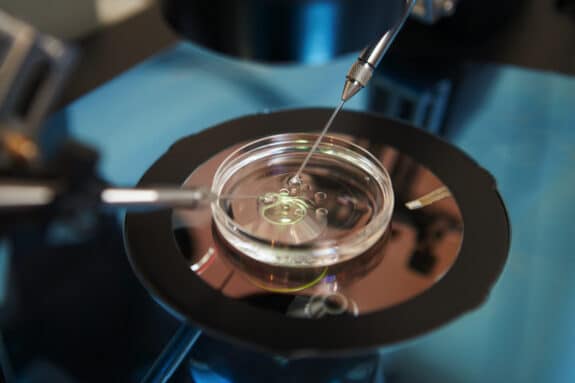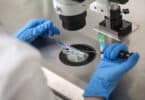Last year, Dr. John Zhang did the unthinkable. He performed a three-parent in vitro fertilization treatment and eliminated mitochondrial disease for one very lucky family. A condition that often results in death for any infants born with it, mitochondrial disease is passed down from the mother to the baby.
Scientists have been working on removing the defective mitochondria from the mother’s eggs (which is how the condition is passed down) and then implanting healthy mitochondria from a donor. The UK has allowed its use, but the United States and Canada have not.
To get around the United States’ regulatory issues, Dr. Zhang traveled to Mexico to perform his “spindle nuclear transfer” procedure – a process in which the removal and implantation of mitochondria are done before the egg is fertilized. Now he is marketing the technique to couples, saying he can help them conceive healthy and thriving babies, but the Food and Drug Administration (FDA) is calling him out by warning couples of the possible risks.
A Closer Look at Mitochondrial Disease
Mitochondria are called the cell’s powerhouse for a reason – they provide the cells and the entire body with energy. They have their own DNA and make up less than one percent of the egg’s structure. If a mother’s defective mitochondria are passed down to her baby, the infant may deal with a variety of complications, including muscle weakness, heart problems, stroke-like episodes, diabetes, epilepsy, and possibly fatality.
Removal and implantation of donor mitochondria can eliminate such complications, but the FDA refuses to approve testing. The concern is over genetically modified embryos – or “designer babies” – because some lawmakers feel it is too much like “playing God.” But is it really, or is Dr. Zhang (for all his faults in refusing to follow regulations) a hero?
The FDA’s Warning to Dr. Zhang
Dr. Zhang’s run-in with the FDA started when he requested a “pre-investigational new drug (IND) meeting for a clinical investigation of a ‘spindle transfer for assisted pregnancy in patients with mitochondrial disease.’” That was on April 22, 2016 – days after the mother of the embryo in question gave birth to a healthy baby boy.
Zhang’s request was denied, and he was specifically asked not to market the procedure until an IND on the procedure was in place. He continued to market it anyway and is now being reprimanded. He has been asked to contact the FDA directly, and in writing, to explain the steps he has taken to address the violations against him, and how he plans to prevent their reoccurrence. If he fails to comply, he could be at risk for the loss of his medical license.
Is the U.S. Being Unreasonable?
Although Zhang essentially claims to have pioneered the spindle procedure, Professor Hank Greely of Stanford University says that similar procedures have been done in the past but were stopped over the FDA’s concerns about cloning. The UK is also doing a similar procedure (which wasn’t permitted until after additional safety tests) that involves fertilizing both the mother’s and donor’s eggs prior to removal and implantation of the cell’s nucleus. Doctors in Ukraine also recently announced the birth of a baby girl that was conceived using a similar technique.
That brings us to the question of whether the U.S. is being unreasonable or not in their refusal to move forward with procedures like Zhang’s spindle transfer method, or even the pronuclear transfer being used in the UK and Ukraine. Perhaps, but there are some valid concerns that should be considered. Take the little girl born in the Ukraine as an example.
Because her mitochondrial DNA was altered, she will pass down any modifications to any children she might have in the future. Science does not yet know the possible implications of this, and safety testing at this point is difficult – partly because of the regulatory issues. What’s the solution? At this point, no one can really say. However, when one considers the miracles that mitochondrial removal and implantation may work, it certainly seems a shame that we haven’t budged since our reporting on Dr. Zhang last year.
What do you think? Should the United States make way for progress, or do they have the right idea, banning genetic modification of embryos? We’d love to hear your opinion!







